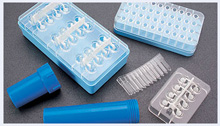That’s right: sustainability. There’s another buzz word that’s becoming increasingly associated with plastics: recycling. Those are definitely two concepts the average consumer — or plastic injection molded medical device manufacturer — wouldn’t normally associate with plastics.
Not all manufacturers are thinking about saving the planet; some are undoubtedly jumping on the bandwagon to curry favor with green-minded customers. Others are looking for ways to cut costs or align their manufacturing practices with their company mission. Whatever their motivation, 13% of plastic medical device company CEOs see sustainability as their #1 priority, while another 36% view it as one of their top three goals.
OK, realistically, how significant is it that plastic medical device manufacturers are thinking — and operating — as if sustainability is a serious priority? Answer: very significant, at least eventually. More than 300 million tons of plastic are produced annually, and that number is growing considerably. Unfortunately, it’s estimated that less than 3% of that plastic is recycled.
So what medical plastic molding processes lend themselves to recycling?
There is a continuum: some processes, like thermo-forming, are easily 100% recyclable. Other processes, like fiberglass or thermoset manufacturing processes such as RIM or fiberglass molding, are either non-recyclable or can only be down-cycled into other materials.
Other easily recyclable processes include pressure forming, vacuum forming, plastic injection molding and blow molding.
Designing for device “end-of-life”
It’s important to remember that the products we create today will someday be thrown away. After all, even the most sophisticated medical device won’t last forever. If you’re serious about sustainability, you must think about and actively plan for the day your products are discarded.
No matter what manufacturing process you use, consider the following key factors when designing for a product’s entire life-cycle:
- materials selection
- number of different types of material
- size of your device
- ease of disassembly
- contamination with other materials
- technology changes (how soon will it be obsolete?)
- durability
- hazardous materials
Really, what better material to recycle than plastics?
Most people have heard it takes thousands of years for plastic to bio-degrade, and they’re right. That just means it’s critical for medical device manufacturers to embrace sustainability, just as every other manufacturing sector has.
